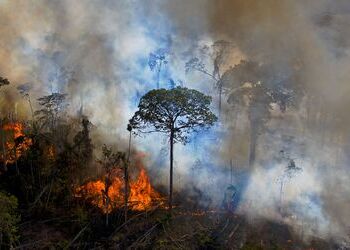Colombia is rolling out a new strategy to fight deforestation, including charges for those causing environmental devastation – a crime for which there is no shortage of culprits.
On December 6, Colombia’s environmental ministry and police jointly announced the new measures, which include a dedicated anti-deforestation police force and reinforced online monitoring to track the illegal sales of flora and fauna. Enhanced protection is also to be provided for activists and community leaders, who have been killed in shocking amounts in the country.
Another aspect of the strategy is an emphasis, already put in place last month, on prosecuting those directly responsible for environmental devastation.
In November, three leading dissident commanders, who once belonged to the Revolutionary Armed Forces of Colombia (Fuerzas Armadas Revolucionarias de Colombia – FARC), became the first to be charged with criminal deforestation under a new law aimed at actors involved in environmental devastation.
On November 24, Attorney General Francisco Barbosa Delgado announced charges against Miguel Botache Santillana, alias “Gentil Duarte,” Nestor Gregorio Vera Fernández, alias “Iván Mordisco,” and Géner García Molina, alias “John 40,” all major figures in what InSight Crime has termed the ex-FARC Mafia. Barbosa accused the three men of “fomenting the destruction of Colombia’s Amazon” and “promoting deforestation in zones of special ecological importance.”
Barbosa said prosecutors have evidence that the three dissident leaders oversaw the construction of illegal roads through the jungle and razed forest for cattle ranching and the planting of coca crops.
SEE ALSO: The Roots of Environmental Crime in the Colombian Amazon
The commanders are accused of driving deforestation in the central Amazonia region, which accounted for some 60 percent of Amazon forest loss in Colombia in 2020, according to figures from Colombia’s Institute of Hydrology, Meteorology and Environmental Studies (Instituto de Hidrología, Meteorología y Estudios Ambientales – IDEAM).
InSight Crime Analysis
The ex-FARC commanders make for easy targets as the first individuals criminally charged with deforestation after Colombian President Iván Duque signed the new law in August.
The law created six new categories of environmental crime, and reinforced five existing ones, El Tiempo reported. The new crimes the three commanders appear to be charged with include the financing and promotion of deforestation and financing the invasion of protected areas.
The alleged crimes involve the Amazon Rainforest’s Marginal Corridor, a series of illegal roads created by FARC guerillas before the group’s demobilization in 2016. The roads connect municipalities like La Macarena, Vistahermosa, San José del Guaviare and surrounding national parks. The dissidents have continued to extend these roads to facilitate drug trafficking, illegal mining and other activities.
The illegal routes have paved the way for extensive cattle ranching and palm oil cultivation projects, which are legal enterprises. Local politicians and large landowners often have their hands in such projects, and settlers are frequently the ones who execute land clearing.
Charging the FARC commanders was easy, given that they also face a slew of other criminal charges. But prosecutors making cases under these new environmental laws will also have to take into account this array of local collaborators if they wish to show the laws have teeth.

